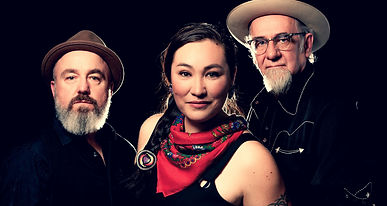



diyet & the love soldiers
Wednesday November 15th, 2023
Gerald C. Wilson Auditorium
Doors open at 6:30 pm; Concert begins at 7:00
Diyet was born in a tent and spent her childhood on the ancestral lands of the Kluane First Nation people in Canada’s Yukon Territory. Coming from a family rooted in traditions but tempered with a good sense of adventurous hippie attitudes, Diyet has created a musical presence that is as diverse as her Southern Tutchone, Tlingit, Japanese and Scottish heritage.
She discovered her voice singing on the school bus, went on to acquire a degree in music, then became a published songwriter in Vancouver, BC. When the pull of the North was too strong, she packed her bags, and her Dutch husband, moving back to her village of 90 people without a plan or even a pub to play in. The result of this unlikely career move has been international collaborations, extensive touring, features in the New York Times, MacLean’s Magazine, and on BBC Radio (Messiah/Complex) .
Backed by the Love Soldiers, she has three acclaimed albums The Breaking Point, When You Were King, and Diyet & The Love Soldiers which received nominations for: “Folk Album Of The Year” at The Indigenous Music Awards, “Indigenous Artist Of The Year” at the Western Canadian Music Awards and won “Indigenous Songwriter Of The Year” at the Canadian Folk Music Awards.
Diyet is alternative country, folk, roots and traditional with catchy melodies and stories deeply rooted in Diyet’s Indigenous world view and northern life. Diyet sings in both English and Southern Tutchone (her native language) and plays bass guitar. Backed by Love Soldiers, husband and collaborator, Robert van Lieshout (acoustic guitar, drums & percussion) and Juno Award winning producer, Bob Hamilton (electric guitar, pedal steel & mandolin); this multi instrumental trio from the Yukon has a sound that can fill a big stage or capture an intimate room.
During the last decade Diyet has performed nationally in Canada and internationally in Europe. Performance highlights include major folk, jazz, world and multi-disciplinary festivals and theatres in Canada, tour in the UK and upcoming tours in Germany & The Netherlands. TV appearances include; APTN Indigenous Day 2019 Live, CTV Atlantic Morning Show, CBC New Years Eve 2020 National Broadcast and Against the Grain Theatre’s Messiah/Complex.
Continuing to live with feet firmly planted in two worlds, Diyet’s adventurous and sometimes chaotic life is on full display in her music. She often says, “yesterday, fishing for our dinner on the ice, the next day, on the stage singing for you!”
This programming/project is
supported in part by the Western States Arts Federation (WESTAF) and the National Endowment for the Arts.
Sponosored by The Islander Bookshop
Artist's Social
community outreach:
.png)
**This workshop is only for middle school students, high school students, and adults.**
Drawing from Diyet’s personal and learned experience as a contemporary and traditional musician, this workshop focusses on Southern Tutchone music, Diyet’s music of land and community, which is presented in her tradition of storytelling. Diyet guides community through a musical encounter of Indigenous identity and understanding. Using a combination of traditional stories and songs; anecdotes from personal experiences; and interactive songs and movement, Diyet seeks to build an appreciation of indigenous music, dispel myths, promote personal resilience and encourage interest in acts of reconciliation.
Workshops start with Diyet singing a traditional song and follows with a formal introduction in Southern Tutchone. From there Diyet tells her story and that of her people through traditional and contemporary stories and song. During the workshop she teaches students a traditional song and invites participants to use her traditional instruments as local protocol allows. The workshop is concluded with opening the floor to discussion and questions.
1.5 hours
Who benefits the most: Indigenous students, all students
The workshop is modified to delve deeper into the residential school history, self-determination and acts of reconciliation.
30 minutes: Stories and Songs
20 minutes: The floor is open
25 minutes: Guided discussion on creating space
20 minutes: Teaching a traditional song
5 minutes: Wrap up



